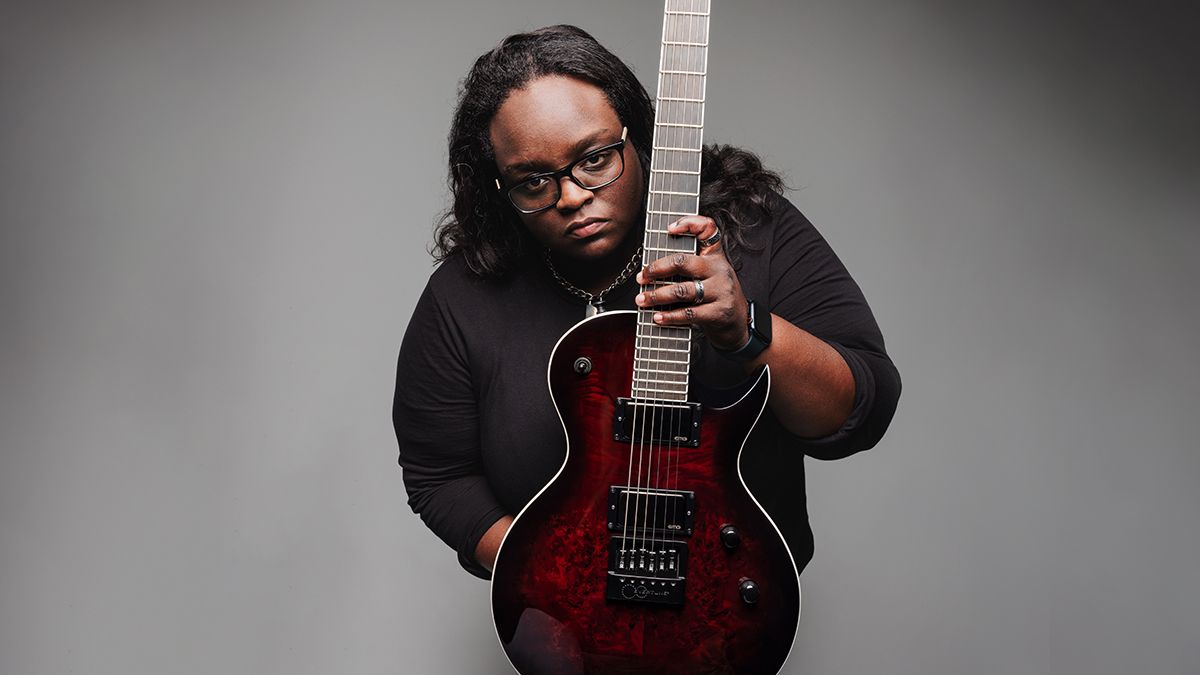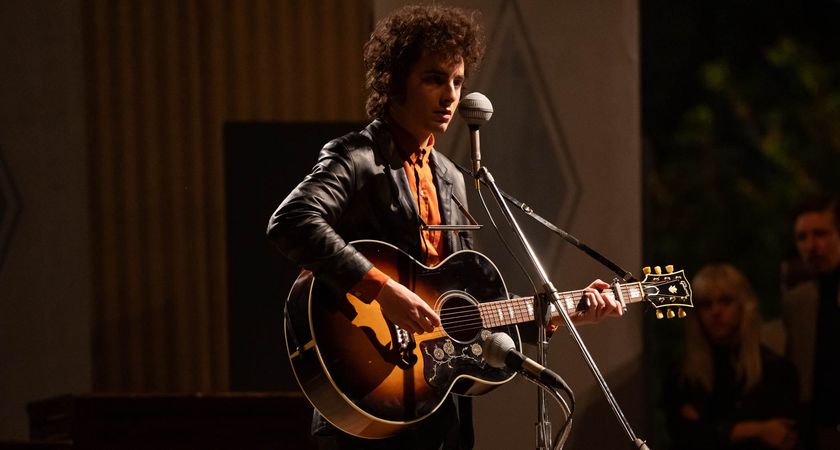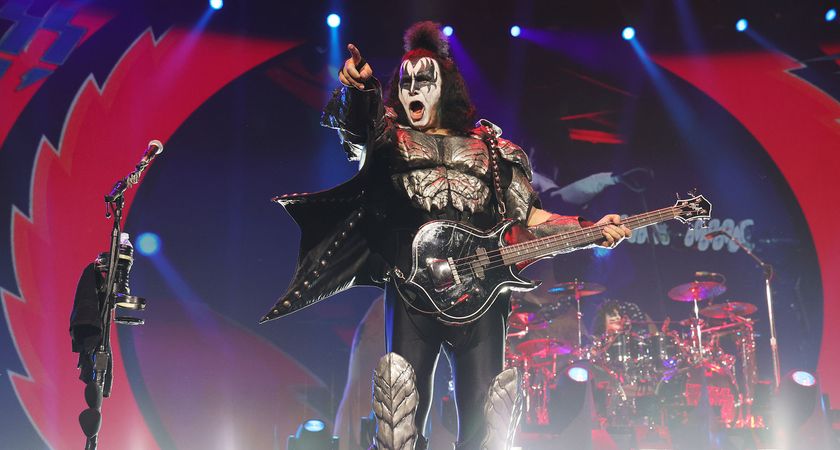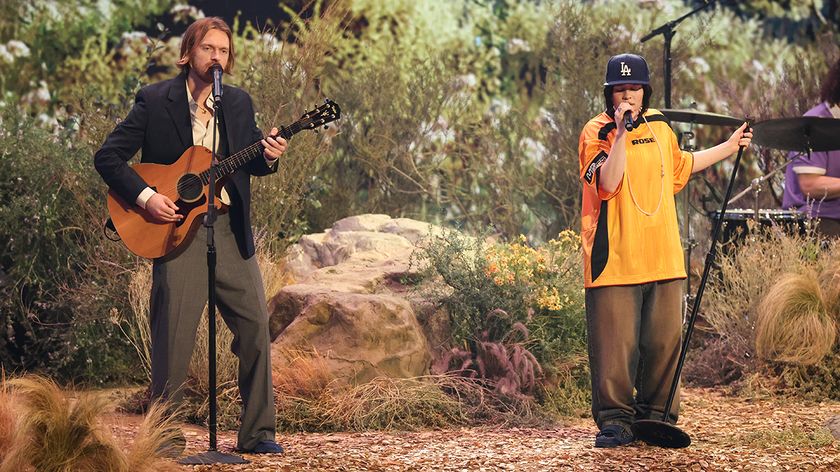“I’m all about Dimebag and Zakk Wylde!”: Tetrarch guitarist Diamond Rowe salutes the giants of metal
Plus: the secret to her aggressive tones

Tetrarch guitarist Diamond Rowe recently made history with the launch of her signature guitar - the first signature Jackson for a female player, and as the first artist model for a black female performing heavy metal for the industry as a whole.
Now she tells MusicRadar all about her evolution as a player, her formative influences and her approach to creating super-heavy tones.
Your band recently released a new song called Live Not Fantasize, which almost has a Rob Zombie kind of stomp to it…
“A lot of people have mentioned they can hear Rob Zombie in there. The main riff actually started out as a joke! I was at home, it was late, probably around one in the morning, and I was sat at my computer experiencing writer’s block. I started demoing the dumbest riffs, almost as if to go back to square one.
“And I remember thinking it had that four-on-the-floor beat, that Rob Zombie stomp type thing. We went into the studio with 20 songs and for some reason this one kept making the cut.”
Well, it’s funny how the music can guide you in ways like that…
“The working title for it was Ha Ha and because we couldn’t get rid of it, we kept adding things to it. The more we added in terms of electronics and other sounds, the more cool it started to sound cool. So it’s funny, this lead single started its life as a throwaway!”
Get the MusicRadar Newsletter
Want all the hottest music and gear news, reviews, deals, features and more, direct to your inbox? Sign up here.
There are some interesting effects and electronics, which adds to the industrial flavour…
“When I started to get a vision for the song, after we realised it wasn’t going away, I decided it would be cool to push the industrial element. We’d never really done that before, so that’s why the strong effects and electronics ended up being really prominent. My DigiTech Whammy is literally everywhere. Now when we all meet up, they ask me ‘So did you bring your Whammy?’ It seems I’m the Whammy girl now.”
You even use the Whammy to divebomb, almost like using a bar…
“I do! I’ve started to do that a lot. You’re right... good ear, man! Funnily enough, I tracked the solo to that song with a Jackson Soloist, so there was a bar on the guitar which I ended up using as well as the Whammy, making it all sound even crazier.”
There’s a tapping section in your solo. Where did you learn how to do that?
“I think that bit came from all the Metallica songs I learned as a teenager. They’re my all-time favourite band and I had all the tab books. I spent months jamming along really badly, trying to get better and better. After that my influences were all over the place.
“As a kid, I never discriminated over different types of metal – you know, you get people who only listen to hardcore or metalcore or whatever. I would listen to Korn, Disturbed, Nirvana, Linkin Park... anything heavy. It didn’t matter what kind of heavy. The tapping stuff came from Kirk Hammett and Dimebag Darrell. When we started thinking about what Tetrarch was going to sound like, we wanted a lot of that nu-metal vibe – big choruses and creepy melodies. But a lot of those bands didn’t have guitar solos.”
So that’s something you had to learn how to implement?
“Yeah, I made it my mission to fit solos into that kind of sound. I’m a lead player, that’s just what I love. I worked at bringing those shred techniques into our sound, while also using things like the Whammy to make it all sound weird and uncomfortable. But it’s the older generation like Zakk Wylde and Dimebag who taught me how to solo.”
What kind of amps are you using on the latest recordings? We noticed you were plugged into an EVH head for some of the Jackson promo footage...
“The new album was tracked with Neural DSP Gojira plug-in and then we reamped later through the EVH heads. What’s funny is that the reason we tried out EVH heads was also because of Gojira. I believe Joe Duplantier uses the Stealth and Christian Andreu has the EL34. We tried those exact amps because of how crushing Gojira sound live and it worked out great for us.”
Other than the Whammy, what kind of pedals would we find on your ‘board?
“We call my tone ‘The Freak Tone’ because it has the modulated, Korn-inspired kind of sound. We stumbled upon it years ago and were actually using Line 6 Pod Farm to obtain it. I think there was this sine-wave chorus that we couldn’t find anywhere else. Now Pod Farm is antiquated, apparently, so we use analogue pedals. I have a Dunlop Uni-Vibe, a Boss DD7 and a Boss Super Chorus, but all at the same time to create one effect.”
You mentioned there’s a new album on the way. What makes it different to 2021’s Unstable?
“On these new songs, we’ve really tried to write the biggest choruses we can. We’re really proud of that. Our influences were always gateway metal bands that anybody could listen to and enjoy. Obviously we make music for metal fans first and foremost, but we want everyone to enjoy listening to us.
“It’s the same as Enter Sandman – anyone can listen to that, even if they’re not a metalhead. This album has moments that are really catchy, some of my best lead work and some interesting electronics, like on the first single. Some of the songs are quite basic when you strip away the leads and textures, but that’s how we created so much character and personality. I sing on this record, too!”
That’s interesting! What do you sound like as a singer?
“I’ve done some backing vocals in the past, just for textural stuff. But this time round I’ve actually sung my own verses and sections. It came out really cool. Honestly, I don’t know how I sound!”
From a production standpoint, what’s the secret to the aggressive guitar tones you are best known for?
“Anything EQ-related is [singer/guitarist] Josh’s wheelhouse. He’s the audiophile in the band, along with our producer Dave Otero, who is a death metal guy. Dave has done Allegaeon, Cattle Decapitation and Fallujah... those types of records. We’re the softest band he’s worked with!
“So I think some of the aggression comes from how he mixes, that’s just what he’s used to. I think it’s cool because we don’t get mixed like other bands in our genre, and it makes us sound extra heavy. Josh and I are heavy right-hand pickers. We both hit our guitars hard. We don’t play super technical riffs, instead we write ones that bite and make you go ‘Hell yeah!’ We play really clean so you can hear all the intricacies. The heaviness is a mixture of different things.”
There’s something special about the chemistry between you and Josh. What’s the secret?
“Josh and I have been playing together since we were 12, so we’re very locked into each other. We grew up together as guitar players, so it’s a very natural chemistry. What I’m lacking, he picks up and vice versa. I’m a gain fanatic, you’d probably think ‘Oh my god’ if you saw how much I usually turn it up to. I will start at five and work my way up to seven! Josh is more moderate, on the other hand, and wouldn’t go that high. So that works out really cool.
“My tone is more saturated, his is more clean. I have the body and heaviness, he has the clarity. He uses the EVH Stealth and ESP pickups with the EMG 57/66 set, which is aggressive but more vintage-sounding than my 81/85. A lot of people have mentioned that it’s good to see EMGs in a signature again. And I realised that recently a lot of signatures have had Fishmans or Seymour Duncans or whatever. I always tell EMG ‘I’m your girl’ because they always sound great.”
If you could get a guitar lesson from any of your heroes, who would you choose?
“I’d choose Kirk and James from Metallica. I started playing guitar along to those guys, watching all their DVDs and documentaries. They were my teachers. I’d love to jam with them. I know so many of their songs, it would be fun to pick up some guitars and run through Master Of Puppets or One.
“That would be a full-circle moment for me. I’d also love to hang with them as human beings. Because it’s easy to see them as larger-than-life gods who are untouchable. It would be nice to hang out as normal people and just talk about music and life in general.”
What’s next for you as a player – how exactly do you hope to develop?
“That’s a good question. I always happen upon new things I want to try by accident. I never really set my mind to things. Because when I do that, I just crash and burn out. If I organically walk into something new, I will find it more interesting to explore. I’m definitely the kind of player who is song-focussed and looking to make even the most basic song sound interesting. I like to layer different leads and melodies on top of each other, a bit like how Korn do.
“I could sit in a room with pedals for hours, making up weird sounds and layering them over each other. Josh will come into the room and ask ‘Are you high or something?’ And I don’t even smoke, I just like getting lost in the music. My main ambition is to keep on getting better at writing songs and creating sounds, rather than learning new techniques and things like that.”
And do you ever absorb much from players outside of metal?
“As I’ve gotten older, I’ve started to look at players from other genres and appreciate what they do. I was watching footage of John Mayer the other day and thought, ‘That dude’s a really freaking good guitar player!’ His stuff is so out of my wheelhouse but it did inspire me to sit down and mess around with that kind of sound. I think his chords and tones are awesome. But coming from a metal and hard rock background, I’ve never spent much time learning other styles. I’m all about Dime, Zakk and players like that!”
Amit has been writing for titles like Total Guitar, MusicRadar and Guitar World for over a decade and counts Richie Kotzen, Guthrie Govan and Jeff Beck among his primary influences. He's interviewed everyone from Ozzy Osbourne and Lemmy to Slash and Jimmy Page, and once even traded solos with a member of Slayer on a track released internationally. As a session guitarist, he's played alongside members of Judas Priest and Uriah Heep in London ensemble Metalworks, as well as handling lead guitars for legends like Glen Matlock (Sex Pistols, The Faces) and Stu Hamm (Steve Vai, Joe Satriani, G3).

“I loved that he showed up with a $200 guitar… It’s humble”: Timothée Chalamet learned to play guitar for his Oscar-nominated role in Bob Dylan biopic on a beginner Yamaha acoustic

“AI is about as close to reality as you can ever imagine”: Gene Simmons discusses the prospect of a virtual KISS and says the “future of entertainment is here”
Most Popular








